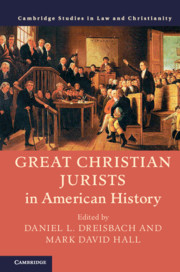Book contents
- Great Christian Jurists in American History
- Law and Christianity
- Great Christian Jurists in American History
- Copyright page
- Dedication
- Contents
- Contributors
- Preface
- Introduction: Christianity and American Law
- 1 John Cotton and Roger Williams
- 2 John Winthrop and the Covenantal Ideal
- 3 Friendly Laws: William Penn’s Christian Jurisprudence
- 4 The Friendly Jurisprudence and Early Feminism of John Dickinson
- 5 Roger Sherman, Oliver Ellsworth, and the Formation of America’s Constitutional Order
- 6 John Jay: The First Chief Justice
- 7 James Wilson
- 8 Was Justice Joseph Story a Christian Constitutionalist?
- 9 Harvard’s Evangelist of Evidence: Simon Greenleaf’s Christian Common Sense
- 10 John Marshall Harlan the Elder
- 11 Judicial Conservatism and Protestant Faith: The Case of Justice David J. Brewer
- 12 John T. Noonan, Jr.: Catholic Jurist and Judge
- 13 The Integrative Christian Jurisprudence of Harold J. Berman
- 14 Antonin Scalia: Devout Christian; Worldly Judge?
- 15 The Insights and Transitions of Mary Ann Glendon
- 16 A Reformed Liberalism: Michael McConnell’s Contributions to Christian Jurisprudence
- 17 The Jurisprudence of Robert P. George
- Index
12 - John T. Noonan, Jr.: Catholic Jurist and Judge
Published online by Cambridge University Press: 24 June 2019
- Great Christian Jurists in American History
- Law and Christianity
- Great Christian Jurists in American History
- Copyright page
- Dedication
- Contents
- Contributors
- Preface
- Introduction: Christianity and American Law
- 1 John Cotton and Roger Williams
- 2 John Winthrop and the Covenantal Ideal
- 3 Friendly Laws: William Penn’s Christian Jurisprudence
- 4 The Friendly Jurisprudence and Early Feminism of John Dickinson
- 5 Roger Sherman, Oliver Ellsworth, and the Formation of America’s Constitutional Order
- 6 John Jay: The First Chief Justice
- 7 James Wilson
- 8 Was Justice Joseph Story a Christian Constitutionalist?
- 9 Harvard’s Evangelist of Evidence: Simon Greenleaf’s Christian Common Sense
- 10 John Marshall Harlan the Elder
- 11 Judicial Conservatism and Protestant Faith: The Case of Justice David J. Brewer
- 12 John T. Noonan, Jr.: Catholic Jurist and Judge
- 13 The Integrative Christian Jurisprudence of Harold J. Berman
- 14 Antonin Scalia: Devout Christian; Worldly Judge?
- 15 The Insights and Transitions of Mary Ann Glendon
- 16 A Reformed Liberalism: Michael McConnell’s Contributions to Christian Jurisprudence
- 17 The Jurisprudence of Robert P. George
- Index
Summary
This chapter examined the foundations of Judge John T. Noonan Jr.’s personalist jurisprudence. It looks first at some principal sources for his work, in particular Étienne Gilson and Jacques Maritain. It then engages in a close analysis of Noonan’s book, Persons and Masks of the Law, reflecting on the ways in which Noonan insists that while rules matter in the legal process, rules depend for their efficacy on the persons applying, complying, and evaluating those rules. The chapter then shifts its focus to consider two further aspects of Noonan’s thought: the centrality of narrative and love to the operation of the law. We are defined by narrative, Noonan demonstrates. This is so for us as individuals and as communities. Thus the legal process can only be understood through story. And we must relate to one another in love. This is true as much for individuals responding to the needs of others as it is for lawyers and judges seeking to interpret the words of contracts or wills.
- Type
- Chapter
- Information
- Great Christian Jurists in American History , pp. 208 - 229Publisher: Cambridge University PressPrint publication year: 2019

